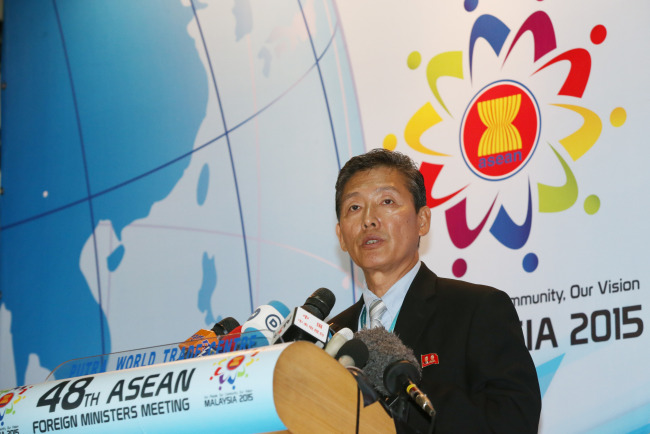North Korea lashed out at the U.S. for “aiming to remove” its socialist regime Thursday, saying that whether it would push ahead with another nuclear test depends on the “U.S. attitude.”
 |
| Ri Tong-il, North Korea’s former deputy U.N. representative, speaks during a press conference in Malaysia on Thursday. (Yonhap) |
On the sidelines of the multilateral ASEAN-related meetings in Malaysia, Ri Tong-il, Pyongyang’s former deputy U.N. representative, also warned that the U.S. military buildup targeting the communist state could result in a second Korean War.
“While the U.S. resorts to its measures to choke up our economy, it is evading negotiations and dialogue (with the North),” Ri said. “The U.S.’ strategic goal is to eliminate the North’s socialist system.”
Meanwhile, South Korean Foreign Minister Yun Byung-se on Thursday renewed Seoul’s calls for Japanese Prime Minister Shinzo Abe to uphold Tokyo’s past apologies for its wartime atrocities in his planned speech to mark the 70th anniversary of the end of World War II.
During his meeting with Japanese Foreign Minister Fumio Kishida on the sidelines of the ASEAN Regional Forum in Malaysia, Yun said that the speech would be important for the two nations to “disentangle” the bilateral relations strained due to historical and territorial squabbles.
Kishida reportedly said that in his speech, Abe would express repentance for Japan’s wartime aggression and pledge to continue its path as a pacifist country.
Abe is expected to deliver the speech next Friday, according to Japanese media. Analysts say that the prime minister could mention Japan’s repentance for its wartime atrocities, but might not touch on its 1910-45 colonization of the Korean Peninsula.
During the 18-minute talk, the two ministers shared the viewpoint that Seoul and Tokyo needed to work together to promote a “virtuous cycle” in enhancing bilateral ties, a Seoul official told reporters, declining to be named.
They also agreed to continue close communication to push for a trilateral summit among the leaders of South Korea, China and Japan at the “earliest convenient time” this year as agreed upon during the trilateral meeting among the three foreign ministers in March in Seoul.
Foreign ministers of 27 Asia-Pacific states discussed an array of regional and global security issues including escalating maritime disputes in the South China Sea and North Korea’s development of nuclear arms during a regional security forum in Malaysia.
At the ASEAN Regional Forum, Yun, U.S. Secretary of State John Kerry, Chinese Foreign Minister Wang Yi and others explored ways to defuse tensions from the territorial disputes and enhance cooperation on climate change, health security and other issues.
North Korean Foreign Minister Ri Su-yong also attended the multilateral forum.
Capitalizing on the ASEAN-related meetings, Yun tried to secure cooperation from the international community in preventing the North from engaging in yet another provocative act and pressuring it to come out for dialogue.
Speculation has been rising that the North would launch provocations such as a long-range rocket launch around Oct. 10, the 70th anniversary of the foundation of its ruling Workers’ Party, in order to strengthen national unity and show off its military might to the outside world.
Before the ARF foreign ministers’ meeting, the ministers also attended the “ASEAN plus three” meeting including the three Northeast Asian states of South Korea, China and Japan, and the East Asia Summit meeting, where Yun also stressed the need to pay more attention to the evolving nuclear threats from the North.
By Song Sang-ho(sshluck@heraldcorp.com)

